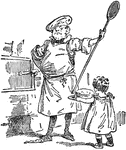Clipart tagged: ‘Baker’

Joseph in Prison with the Cup-Bearer and the Chief Baker
"And Pharaoh was wroth against his two officers, against the chief of the butlers, and against the chief…

Man & Child Baking Bread
An illustration of a man holding a large bread board and a young girl holding a tray with a loaf of…

Pistor
"A baker, from pinsere, to pound, since corn was pounded in mortars before the invention of mills. At…